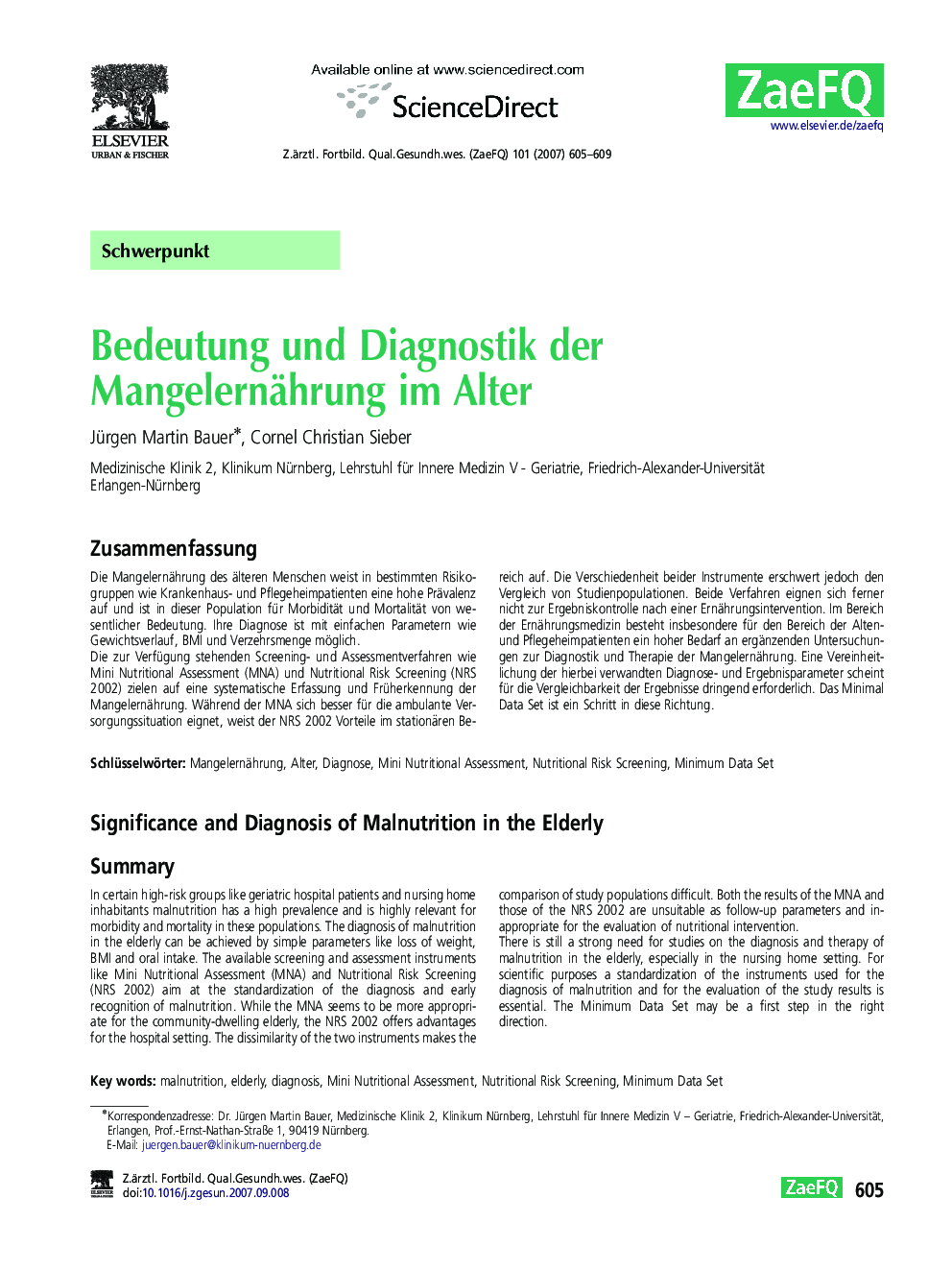| کد مقاله | کد نشریه | سال انتشار | مقاله انگلیسی | نسخه تمام متن |
|---|---|---|---|---|
| 4202532 | 1279461 | 2007 | 5 صفحه PDF | دانلود رایگان |

ZusammenfassungDie Mangelernährung des älteren Menschen weist in bestimmten Risikogruppen wie Krankenhaus- und Pflegeheimpatienten eine hohe Prävalenz auf und ist in dieser Population für Morbidität und Mortalität von wesentlicher Bedeutung. Ihre Diagnose ist mit einfachen Parametern wie Gewichtsverlauf, BMI und Verzehrsmenge möglich.Die zur Verfügung stehenden Screening- und Assessmentverfahren wie Mini Nutritional Assessment (MNA) und Nutritional Risk Screening (NRS 2002) zielen auf eine systematische Erfassung und Früherkennung der Mangelernährung. Während der MNA sich besser für die ambulante Versorgungssituation eignet, weist der NRS 2002 Vorteile im stationären Bereich auf. Die Verschiedenheit beider Instrumente erschwert jedoch den Vergleich von Studienpopulationen. Beide Verfahren eignen sich ferner nicht zur Ergebniskontrolle nach einer Ernährungsintervention. Im Bereich der Ernährungsmedizin besteht insbesondere für den Bereich der Alten- und Pflegeheimpatienten ein hoher Bedarf an ergänzenden Untersuchungen zur Diagnostik und Therapie der Mangelernährung. Eine Vereinheitlichung der hierbei verwandten Diagnose- und Ergebnisparameter scheint für die Vergleichbarkeit der Ergebnisse dringend erforderlich. Das Minimal Data Set ist ein Schritt in diese Richtung.
SummaryIn certain high-risk groups like geriatric hospital patients and nursing home inhabitants malnutrition has a high prevalence and is highly relevant for morbidity and mortality in these populations. The diagnosis of malnutrition in the elderly can be achieved by simple parameters like loss of weight, BMI and oral intake. The available screening and assessment instruments like Mini Nutritional Assessment (MNA) and Nutritional Risk Screening (NRS 2002) aim at the standardization of the diagnosis and early recognition of malnutrition. While the MNA seems to be more appropriate for the community-dwelling elderly, the NRS 2002 offers advantages for the hospital setting. The dissimilarity of the two instruments makes the comparison of study populations difficult. Both the results of the MNA and those of the NRS 2002 are unsuitable as follow-up parameters and inappropriate for the evaluation of nutritional intervention.There is still a strong need for studies on the diagnosis and therapy of malnutrition in the elderly, especially in the nursing home setting. For scientific purposes a standardization of the instruments used for the diagnosis of malnutrition and for the evaluation of the study results is essential. The Minimum Data Set may be a first step in the right direction.
Journal: Zeitschrift für ärztliche Fortbildung und Qualität im Gesundheitswesen - German Journal for Quality in Health Care - Volume 101, Issue 9, 20 December 2007, Pages 605–609